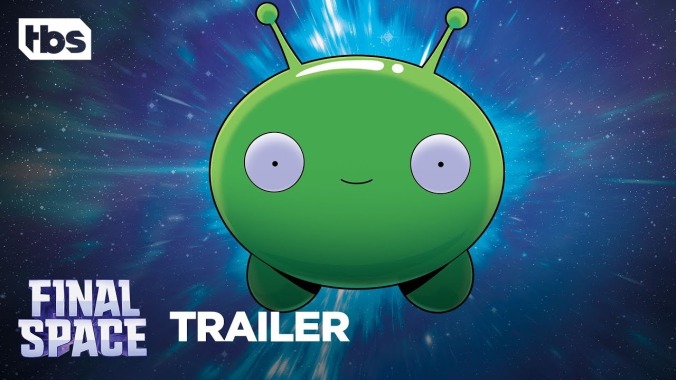Final Space is animated sci-fi comedy with trouble entering warp speed

American cartoons were birthed in the crucible of short attention spans, and despite periodic exceptions, they’ve pretty much remained in that particular segment of the animation world. Turn on any contemporary animated series in the U.S., and you’ll see the ongoing influence of Tex Avery, Walt Disney, and others in creating light-speed, whip-smart entertainment not meant to be lingered over so much as retroactively realizing, “Hey, that was funny,” two seconds after your brain registers the fleeting images. Even as anime’s contributions continue to seep into nearly every aspect of the medium to a greater or lesser degree, the dizzying “hit it and quit it” approach to humor and storytelling remains the dominant American model. It’s a model of which Final Space is the latest, and deeply frantic, iteration.
Despite the adults-focused time slot and some occasional PG-13 jokes, Final Space, the new Conan O’Brien-produced animated comedy set in the galaxy-traversing future, works better as a freewheeling kids’ show than one exploring the kind of mature-theme depths mined by similar series like Rick And Morty. Its sense of humor is very much the “everything and the kitchen sink” variety, as ready with wheezing Borscht-belt one-liners as it is with sight gags or wit. It’s the type of show where an alien will announce his species, “I’m a Ventraxian,” and the human protagonist will immediately fire back, “Well, I’m a Presbyterian, myself.” You’d be forgiven for awaiting the rimshot sound effect, if the series wasn’t always rushing headlong into the next dialogue, perhaps aware that wobbly material is better served as a blitz than a strategic release.
The nonstop motormouth delivery is largely provided by Gary Space (show creator Olan Rogers), a hyperkinetic braggart currently serving a prison sentence for impersonating a pilot in the Infinity Guard, the service tasked with keeping peace in the universe. (He stole a uniform to impress a young Guard member named Quinn, voiced by Ride Along and Southside With You’s Tika Sumpter, and instead accidentally blew up 92 spacecraft due to being unfamiliar with ship controls.) Assigned to solitary imprisonment aboard a small ship, for the past five years Gary’s only company has been the ship AI, Hue (SpongeBob SquarePants’ Tom Kenny); KVN (pronounced “Kevin”), his bubbly and much-loathed Deep Space Insanity Avoidance Robot Companion (Fred Armisen); and the various droids tasked with keeping the ship in shape. He leaves daily video messages for Quinn, believing they had bonded before his imprisonment, but to get a sense of just how lonely he’s become, Gary has stuck eyes and a mouth on the ship’s refrigerator and named it “Beth.”
The plot unsteadily lurches into motion when Gary unintentionally runs smack into a little green alien he names Mooncake (Rogers again), a lovable blob that utters only adorable gibberish noises and who resembles nothing so much as “Helium” from those old Strindberg & Helium online shorts. The unlikely pair immediately bonds, which is bad news for Gary: It turns out Mooncake is being pursued by a tiny malevolent being named Lord Commander (David Tennant), because the balloon-shaped green guy is the key to curing the commander’s mortal illness, by opening a tear in the universe leading to something called “final space”—which will, of course, also be the death of nearly all other life. Joining forces with a cat-looking bounty hunter named Avocato (Coty Galloway), Gary and his shipmates will try to keep Mooncake safe, all while tracking down Avocato’s missing son, Little Cato (Steven Yeun)—and, of course, eventually coming into contact with Gary’s beloved Quinn.
The main problem with Final Space, unfortunately, is its hero: Gary simply isn’t an engaging enough character to carry this series. More than that, he tends to be actively irritating—hyper and obnoxious in an off-putting, rather than appealing, way. His logorrhea can be entertaining at times, if a bit pedantic (in response to an insult, he sniffs, “Okay, I didn’t expect that hurt-coin deposit in my sadness savings”), but more often than not his wild gesticulating and goofy patter doesn’t play to the top of the audience’s intelligence. Stupid has to be done smart in order to work, and with Gary, the character is often reduced to the bravado and maturity of a not particularly inspired 10-year-old.
Additionally, the show realizes it needs some emotional stakes to get viewers invested, but the ones in the first half of the season are introduced abruptly, in ways not fully earned. After three episodes of scattershot humor and some dark beats (Gary’s arm is ripped off, spurting blood, at one point), the show suddenly tries to begin interjecting moments of slowed-down emotional button-pushing, scoring momentous scenes with cathartic ballads that feel out of place amid all the juvenile silliness. The last of the six episodes provided for review ends in a genuinely dark place, with life-changing consequences set to heart-tugging music, but the show hasn’t created enough trust to make the choice land.
Thankfully, the upshot of a comedy throwing everything against the wall means some things are going to stick, and the hit-to-miss ratio is steady enough that the early installments remain diverting. Every time it threatens to devolve into childish nonsense, a visual gag will land, like Gary pausing mid-fleeing the ship just to go back and kick KVN when he’s down, or dumb-funny wordplay like KVN turning his mandate to do nothing but fix all the holes in the ship’s hull into an unintentionally foul song (“Nothing but holes, but holes, but holes”). Each episode starts with a flash-forward to Gary floating in space, only 10 minutes left of air, and each episode counts down another minute, a clever narrative device that provides an unusually effective framing tool for the entire story. Final Space needs to find a smarter path to its humor (and force its main character to grow up), but the Futurama-meets-Steven Universe premise holds promise, and with some adjustments, this series could potentially launch into hyper-speed.